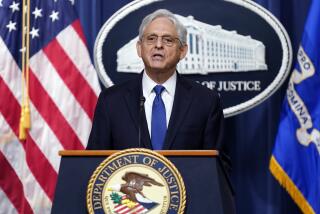For Obama, interrogation fight won’t be welcome
- Share via
MARTHA'S VINEYARD, MASS., AND WASHINGTON — In naming a special prosecutor to investigate the CIA’s use of harsh interrogation tactics, the Obama administration has plunged into just the kind of controversy it said it wanted to avoid -- a polarizing, backward-looking fight over issues far removed from the president’s top priorities.
At a time when healthcare and other signature initiatives are in trouble on Capitol Hill and President Obama’s approval ratings are slipping, he now faces the prospect of a long, distracting probe into policies of the Bush administration -- policies Obama has already denounced.
And the furor is likely to be all the sharper because it pits the most liberal elements of Obama’s base against the most unyielding elements of the Republican right.
White House Press Secretary Robert Gibbs sought Monday to position Obama out of the line of fire.
“The president has said repeatedly that he wants to look forward, not back, and the president agrees with the attorney general that those who acted in good faith and within the scope of legal guidance should not be prosecuted,” Gibbs said in a statement. “Ultimately, determinations about whether someone broke the law are made independently by the attorney general.”
But keeping the president above the fray may not be easy.
“Unfortunately, the pressure . . . to indict someone will be overwhelming,” said Mark Lowenthal, a former senior CIA official. That will produce “two simultaneous unappealing outcomes,” he said. “Half the population will think it is a whitewash and the right people weren’t indicted. And half the population will think it is a lynch mob.
“If the White House thinks they can control this,” Lowenthal said, “they aren’t nearly as smart as I think they are.”
Obama came into office hoping to put healthcare, energy and other domestic policy issues at the top of his agenda. He sought to avoid delving into the perceived excesses of the Bush administration’s prosecution of the war on terrorism, including the Abu Ghraib abuses in Iraq and allegations of torture elsewhere. Early on, he signaled that intent by refusing to release photographs of CIA interrogations.
But in doing so, he disappointed his liberal base, and created a political dilemma.
Obama cannot afford to lose the enthusiastic efforts of his staunchest supporters -- most of them liberal. They are crucial to the success of the neighborhood-level organization the White House hopes to mobilize for its domestic agenda and build into a permanent, policy-focused fighting force.
At the same time, Obama cannot afford a decline in support from independent voters, who polls show were already registering misgivings about the president. Those voters were crucial to his election victory.
And the White House may be hard pressed to hold a middle position on this issue.
Liberal Sen. Russell D. Feingold (D-Wis.) quickly applauded the special prosecutor decision, but signaled that left-leaning Democrats would not be easily satisfied.
“We cannot simply sweep these abuses under the rug,” Feingold said. “The abuses that were officially sanctioned amounted to torture, and those at the very top who authorized, ordered or sought to provide legal cover for them should be held accountable.”
Civil liberties groups also demanded an uncompromising inquiry. “We need to make sure those all the way up the chain of command are held responsible for their actions,” said Justin Ruben, executive director of the liberal network MoveOn.org.
Conservative critics were equally uncompromising, and they couched their criticism in terms of national security -- a traditional vulnerability for Democrats.
“We must remain mindful that we still are very much a nation at war with terrorists who spend every hour of their day planning how to hurt America and Americans. That’s why reports that the Department of Justice has directed a special prosecutor to investigate the men and women tasked with keeping America safe is such a poor and misguided decision,” said Senate Minority Leader Mitch McConnell (R-Ky.).
Noting that the Bush Justice Department had decided against an investigation into the interrogations, McConnell charged that the Obama administration “risks chilling our defense and intelligence community’s ability to protect us from future terrorist attacks by reopening this matter.”
Connecticut Sen. Joe Lieberman, a Democrat turned independent, struck much the same note.
“Individuals in our military, civilian homeland security and counter-terrorism agencies, and the intelligence community. . . . must of course live within the law,” Lieberman said.
“But they must also be free to do their dangerous and critical jobs without worrying that years from now a future attorney general will authorize a criminal investigation of them for behavior that a previous attorney general concluded was authorized and legal,” he added.
Since special prosecutors’ inquiries have a history of running on for years, generating news and controversy at almost every stage, the polarization of left and right suggests Obama is likely to be dealing with the interrogation issue for the foreseeable future.
--
julian.barnes@latimes.com
Peter Wallsten in Washington contributed to this report.
More to Read
Sign up for Essential California
The most important California stories and recommendations in your inbox every morning.
You may occasionally receive promotional content from the Los Angeles Times.











